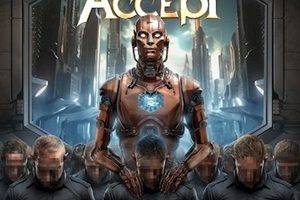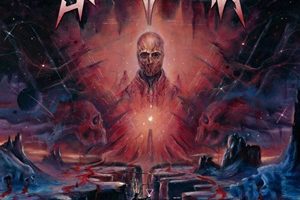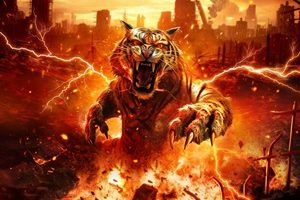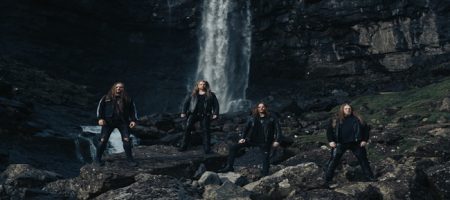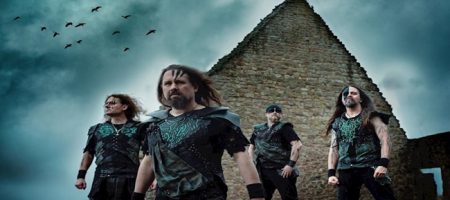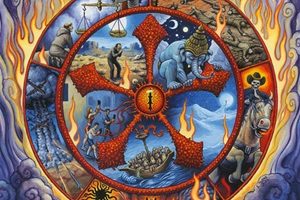Judas Priest – Shattering the Invincible Shield
Sunday, 3rd March 2024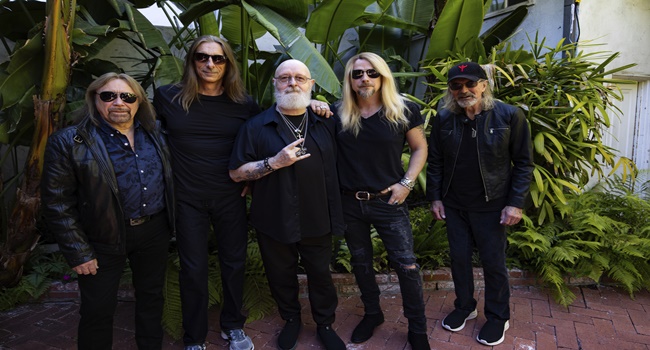
Metal journalism has been in this scribe’s blood since the late 1980’s. After decades of talks with musicians around the globe, there are only a few personal bucket list conversations that would be an honor to cover at any time in my career. To imagine that in my youth the band Judas Priest that brought classic records like Sad Wings of Destiny, Stained Class, British Steel, Screaming for Vengeance, Defenders of the Faith, and Painkiller to my ears would still be alive and thriving in 2024 through their latest album Invincible Shield – plus the opportunity to get to interview a member of said group – it’s a dream come true that aligns to metal’s enduring legacy. Never resting on past accomplishments, the group sets their sights on creating potent, relevant albums that speak to the global legions flying the flag for the genre high.
We got the chance to speak to guitarist Richie Faulkner regarding the new album, single / special edition song choices, how deciding setlists tour to tour come about, learning lessons from the masters, how he handles his heart issues these days, as well as thoughts on if there could be another studio record from the band.
Dead Rhetoric: Invincible Shield is the latest Judas Priest album. How do you feel the songwriting and recording sessions went for this effort – and where do you see this record sitting in the discography of the group?
Richie Faulkner: Everyone has their own opinion on what new Priest stuff sounds like. It’s very interesting to hear. There are always references to Priest – it’s the same band with Halford, Tipton, Hill, Travis has been there for thirty years, and the ground work that they’ve laid for the last fifty years. That character is alive, well, and strong in Invincible Shield. Hopefully we try to push somewhere differently sonically, or whatever way we can to make the album sound like it’s own animal with its own two legs.
The writing and recording, we were able to get together and lay the groundwork for these songs before the lockdown hit. I, Glenn, and Rob, we hashed out these song ideas in demo basic form. Then the lockdowns hit so we couldn’t get together to record it, but it allowed us because of the lockdowns to develop those songs, midsections, musical parts, vocal parts. When we got together to record it, the songs were done, they were there. Then we had to record this around the touring cycle, because we were on tour at the time, we had to fit it around that, so it was a different process than (Firepower).
Albums always have challenges, there is always a challenge that you have to rise above and overcome. When you are young, and you don’t have the money to pay for studio time, maybe you have to do it quickly. It becomes a part of the story of the record.
Dead Rhetoric: Did you feel extra pressure this time around with the guitar recording workload on your shoulders?
Faulkner: I think so. There’s a positive pressure, also following Firepower which really connected really well. There’s a pressure to do as good as and better than the last one. Obviously as well, with my role being a bit different in this one due to Glenn’s challenges that he faced – I never really saw it as pressure, I saw it as that’s what you are there to do. We wanted to do the best record that we can at this time. If I have to take more of a workload because my brother is suffering, I’m there for it. We didn’t have to really think too much about it, that’s what we were going to do.
Dead Rhetoric: How are the decisions made regarding what songs to premiere as singles? Is it a group effort between the band, the label, and management?
Faulkner: Yeah, it is really. When you are writing an album and you write songs, you are very close to them, so you don’t really have an objective opinion. Or less of an objective opinion because you are so close. That’s when management gets involved, that’s when the label gets involved from an outside point of view. They are also looking at the current musical landscape and what’s going on there. How can we get this music to the most people to hear it? We all get together for that. They step in and they really help us out.
Dead Rhetoric: The deluxe edition will have three bonus songs – how tough is it to come to an agreement for which songs should be on the main edition versus the deluxe package?
Faulkner: It’s a good question. We all get together on a phone call and decide between us. We all have different opinions, and we hash those opinions out. My favorite may not be Glenn’s favorite, and Glenn’s favorite may not be the number one that I think should go in that position. That’s what you do, you talk to each other, and you put your opinions out there. There may be something that neither of us has considered and we try that. We want the dynamic of the track listing to be right, a journey instead of one monotone type of experience it goes from here to there like a roller coaster. And also picking the most effective spot for each song. “Crown of Horns” is a mid-paced anthem, and it sort of fades out at the end, and then it thunders in for “As God Is My Witness”. You get the most impact for each song, and where you put that on the record is always taken under consideration.
We knew they all had something. You listen to a band sometimes and the bonus tracks, they are as strong as the ones you include on the original record. “Fight For Your Life” is one of my favorites, hands down. “Vicious Circle” is one of Glenn’s songs. “The Lodger” is unique, that’s a Bob Halligan song that he presented to us. We wanted to get it out there, we wanted the fans to hear it.
Dead Rhetoric: Do you feel more comfortable now being in the band for over thirteen years? Where do you see your role within the group?
Faulkner: Yeah, every year that goes by. In the beginning, we obviously didn’t really know each other very well. Then you build relationships from the music as well. The more time goes on, the more memories you have together, the more experiences you have together, the more trust you’ve earned between all of us. It’s more comfortable in that sense. My role is a songwriter, a guitar player, a team player. I’m just there to do what is asked of me. I was summoned by the metal gods back in 2011, and you do what is the right thing to do and you put everything into it. With Glenn, if my role is to play more guitar parts, I’m there. I’m a big fan of the band, I love the guys, I love playing the music and I do what’s required.
Dead Rhetoric: Being around Rob, Glenn, and Ian for some time now, what lessons have you learned regarding their work ethic and spirit for Judas Priest that you believe has rubbed off on your attitude and energy for the band?
Faulkner: They are always teaching. I don’t think they mean to, but by watching them and being in their company, you pick up what they do and how they do things. I remember one thing, apart from musically, referring to a question you asked earlier about what songs to put out. My young brain wants to put out this one, that one, and another one – all bang, bang, bang! For example, I’ve spoken to Rob, and he tells me you have to save your rockets. If you have a fireworks display, you have to save your biggest ones for the end, like a grand finale. He has the wisdom and the foresight to not just shoot your load straight away, give them a taste – hold back, and the last push you release the finale and that’s when the record comes out.
You can imagine they have a lot of history with that, they know how to do that. Now I know that kind of thing. That’s one of the things you can definitely learn from that experience.
Dead Rhetoric: How is your health these days? Are there new rituals or aspects you have to keep up on to stay in shape, especially for the rigors of the road?
Faulkner: Thanks for asking, I appreciate that. I’m doing well, I go for regular checkups, obviously – and I have a great support system at home on the medical side of things. The fans have been supportive, they sent me a lot of messages and videos initially and that was really amazing. I’ve got to keep up with cardio, initially it was cardiac rehab but now I have to keep up a level of cardio with my heart. We wear leather and studs, we run around a lot under the lights, it’s a bit of a shock to the system if you are not prepared for it. Medication, but I consider myself fortunate with the challenges that I have to face. A lot of people are a lot less fortunate, so I count myself lucky in that regard.
Dead Rhetoric: What is it like shaping up the set list tour after tour? Do you find it’s a balancing act between what the band wants to play, premiering new material, and also throwing in certain surprises for the long-time followers?
Faulkner: Yes, but it’s exciting, it’s great. That means a tour is coming up. You know what you are going to do. With the fifty-year anniversary tour, it was a retrospective of the entire career, a celebration. Now it’s a new record, we’ve got to hit that. We will hit some deep cuts with some obscure stuff, and we’ve got to do some of the classics, the staples of a Priest show. “Hell Bent For Leather”, with Rob on a bike, if you took that out, I think there would be riots. It’s always exciting with what we can pull out for the back catalog. It’s exciting for me as a fan, what haven’t I heard Priest do, what would I love to play. You put your suggestions out there, and we all have a conversation about it. We’ve done that one last year, maybe change that one out for another. We bash a setlist together, we figure out the dynamics, does it hold the energy, does it come down in the right places? If it doesn’t, we move stuff around.
Dead Rhetoric: Has work begun behind the scenes on the second Elegant Weapons effort?
Faulkner: It has. It’s being put together at the moment. Maybe when the Priest tour winds down on this leg, we will look at some opportunities to get that record out after that. Dave Rimmer sent me some bass tracks the other day; it’s sounding really good. He brings another personality to the band, so I get excited for that too. Priest, however long we are out for Priest, when that winds down we will look for the opportunity to release another Elegant Weapons record.
Dead Rhetoric: Are there any particular bucket list items with Judas Priest that you want to achieve that you haven’t been able to as of yet?
Faulkner: Not really. Just being considered to join Judas Priest initially was a pinch me, bucket list kind of experience. First record with Priest was amazing, then we did a second one with Firepower, and now we are doing a third one. I feel really blessed. Bucket list – what more can you ask for really? Coming in on a touring cycle and that was going to be it. Everything we’ve done since then has been all of my wishes coming true.
Dead Rhetoric: How do you see the next year developing for Judas Priest to support the record? Are you hopeful for another studio record for the band?
Faulkner: You never know. As I said, we are always coming up with ideas, melodies, and riffs. That’s just who we are. Never say never, it’s an interesting thing to consider, where would we go. Redeemer of Souls, Firepower, Invincible Shield, where does the next one go? I’d like to do something like British Steel. If Invincible Shield has a few more twists and turns, journeys in the songs. I think something different than that would be a British Steel-type record, where the songs are short, sharp, and concise.
All those sorts of things, should we, could we? Does everyone want to do it? It’s an exciting thing to think about.











